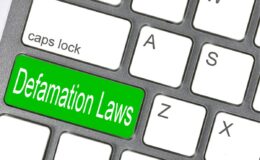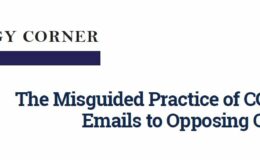New York City Bar Opion 2012-2 – “Inadvertent” Social Media Contact May Violate Rules
- By : Cbh
- Category : Ethics, Social Media
The practice of using search engines and social media to research jurors has existed for several years (arising about the time we stopped using the phrase, “Web 2.0”). In 2009, I wrote a “how to guide” explaining to lawyers how to use social media to research jurors — in a mere three years, while the concept remains sound, most of the instructions have become outdated. That’s fine and, in fact, the steps lawyers use currently to research jurors are actually simplified since Google, Facebook, Twitter, docket searches, and a few other sites have lead to “one stop shopping” results. But it is worth noting how much the technology has changed in three years.
Since that time, however, there has been a wave of ethical opinions around the country explaining that, even on the internet, there can be no direct contact with jurors. You cannot ask a paralegal to Facebook-friend a potential juror. Judges can’t Facebook-friend lawyers but lawyers apparently can friend JA’s (not recommended). In short, a lawyer cannot do on the internet what he or she cannot do in the real world.
The New York City Bar, however, recently threw cold water on the discussion by issuing Opinion 2012-2 suggesting that “attorneys may not research jurors [on the internet] if the results of the research is that the juror will receive a communication.” The Bar went on to state that, even if the lawyer is unaware that the juror might get a notification, this “might run afoul” of the ethical rules. Incidentally, their Rule 3.5(a) is quite similar to Florida’s 4-3.5(d)(1)-(2). Again, like other Bars, there is an admonishment that using third parties, like paralegals, does not cure the problem and, indeed, may be a violation itself.
At first blush, this interpretation of the “no communication” rule seems to be well-founded as a hard and fast rule with clear boundaries. For example, this prohibits Facebook-friend requests (which has been covered in other bar opinions) and, even though the Opinion does not specifically reference it, this Opinion appears to prohibit “following” a juror on Twitter since the person could see that the lawyer has started to monitor his or her posts. Again, not mentioned in the Opinion, this could also cover LinkedIn, which provides a (paying) user with the ability to see who viewed their bio. The Opinion tasks lawyers with researching social media policies before using them in order to avoid this “communication.”
However, by you reading this post on my website, I have gathered information about you. Nothing serious. And nothing more than any other site would gather. In fact, I’d have to log in to my web hosting service to see details about the site traffic. But with some technical doing, I suppose I could determine that the IP address of a particular reader belongs to a law firm. In short, a tech-minded juror might know that your law firm visited his or her blog, let’s say. That scenario may be a stretch — by 2012 standards — but not a long stretch and, as we’ve seen in three short years, the technology will likely change. So, when the Opinion says “search engine websites may be used freely for juror research because there are no interactive functions that could allow jurors to learn of the attorney’s research or actions” — that’s not entirely true nor is that a definitive policy ground which is likely to serve the test of time.
The Opinion rests upon the premise that, by researching jurors online, lawyers could discourage jury service “by the knowledge that attorneys and judges can and will conduct active research on them or learn of their online — albeit public — social lives.” That policy is stated without empirical evidence and, indeed, we’ve certainly come to recognize that jurors are researching us. Perhaps jurors care that lawyers are researching them. Perhaps they don’t. It would be an interesting study to see how jurors react to the idea that they are being investigated beyond voir dire. One might guess, contrary to the NYC Bar, that jurors might expect that lawyers, like everyone else, are turning to the internet.
For a fairly up-to-date “social media ethics quiz,” take a look at this post and powerpoint.
For discussion of NYCB’s new opinion, check their blog.
Thanks to the ABA for the heads up (“Ethics Opinion Warns Lawyers About Perils of Unintentional Juror Contact During Online Research“).


